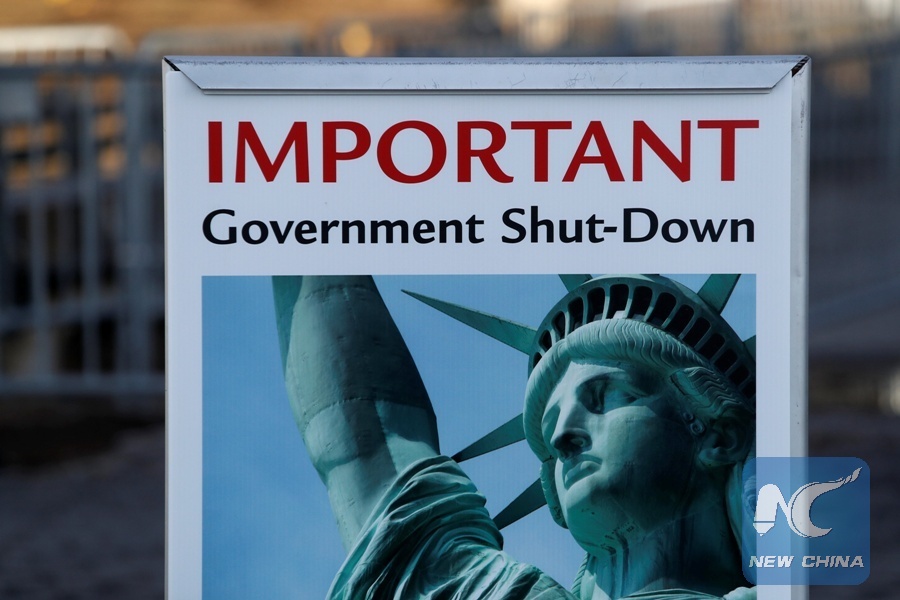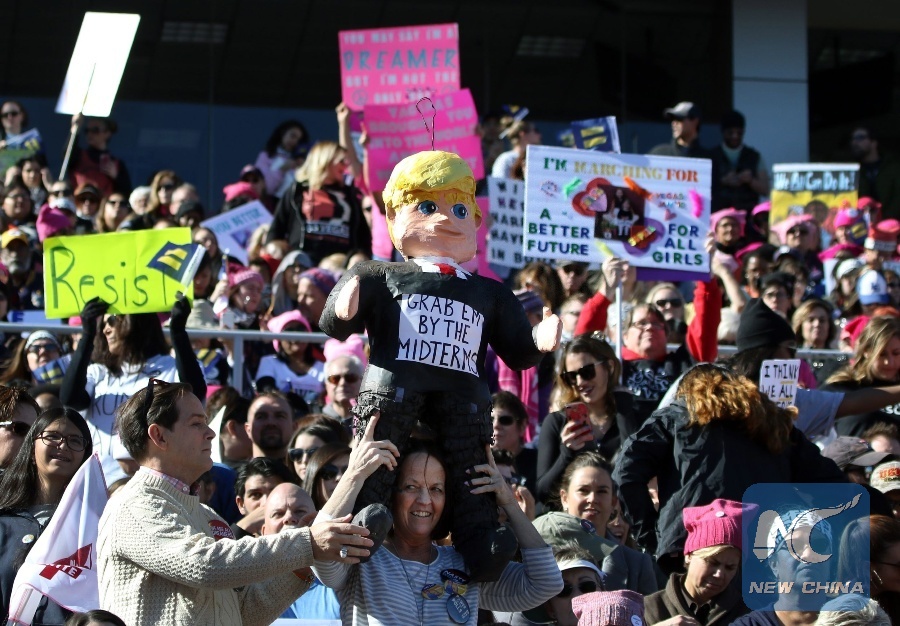
A sign announcing the closure of the Statue of Liberty, due to the U.S.government shutdown, sits near the ferry dock to the Statue of Liberty at Battery Park in Manhattan, New York, U.S., January 20, 2018. (Xinhua/REUTERS)
By Xinhua writer Yang Shilong
NEW YORK, Jan. 23 (Xinhua) -- In agreeing on Monday to end a three-day U.S. government shutdown, the fourth in the past 25 years, Republicans and Democrats made some compromise to bridge the partisan divide.
However, polarization and deep fractures in American politics exposed in the display of partisan dysfunction will only get deeper as fundamentals of the bipartisan bickering have not changed at all, U.S. experts said.

Participants, one with a U.S. President Donald Trump figure, stand strong and applaud with their signs during the Women's March Anniversary "Power To The Polls" event, January 21, 2018 at Sam Boyd Stadium in Las Vegas, Nevada. The rally is aimed at starting a national campaign to register voters, increase support for women and secure progressive seats in the upcoming midterm elections. (Xinhua/ AFP PHOTO)
"TWO ONE-PARTY NATIONS"?
U.S. President Donald Trump signed a bill Monday night to keep the government open until Feb. 8. The stopgap legislation was approved by the Congress earlier in the day after Republicans and Democrats capped off a nearly three-day deadlock over bitter dispute over immigration and border security.
"It is not anything important, just posturing," said Michael C. Munger, professor of political science at Duke University, referring to this round of Republican-Democratic standoff.
"Both sides are using it to make their 'base' feel good. It's expensive, but it's only taxpayer money, so they don't care," he told Xinhua in a written interview on Tuesday.
"It would be embarrassing, but neither party feels any responsibility for 'saving face' for the government," Munger said. "I think THAT is the reason for the polarization: the parties are detached from any sense of responsibility for governing. THAT is a real problem."
"Of course, now it turned out the 'shutdown' was very brief, really just a clown act at the political circus," he said. "I think the real problem is this: Both parties say the other party is incompetent, or evil. Voters may come to believe they are both right... I'm worried that the current system cannot survive."
"In most places, meaningful two-party electoral competition is nonexistent. Rather than being one two-party nation, we are becoming two one-party nations," wrote Lee Drutman, senior fellow in the political reform program at the Washington-based think tank New America, in his article titled The Divided States of America.
Most large cities, college towns, the Northeast and the West Coast are deep-blue Democratic, he elaborated. Ruby-red Republican strongholds take up most of the South, the Great Plains, the Mountain States and the suburban and rural areas in between.
Rather than compete directly against each other, both parties increasingly occupy their separate territories, with diminishing overlap and disappearing common accountability, Drutman said.
"They hear from very different constituents, with very different priorities. The minimal electoral incentives they do face all push toward nurturing, rather than bridging, those increasingly wide divisions."

A protester wearing a Donald Trump mask demonstrates during a "Queer Rage" dance party outside the location of the 2017 "Congressof Tomorrow" Joint Republican Issues Conference in Philadelphia, Pennsylvania, U.S. January 25, 2017. (Xinhua/REUTERS)
DOOM-LOOP PARTISANSHIP?
Although much of the focus on polarization has focused on Congress, state legislatures have become more divided as well, noted Jason Altmire, who served three terms in the U.S. House of Representatives from 2007 to 2013, in his book Dead Center: How Political Polarization Divided America And What We Can Do About It.
Approximately half the states have levels of polarization greater even than those found in Congress, Altmire wrote, citing research done by political scientist Boris Shor, "the problem has left many Americans feeling that they are not being represented."
The government shutdown is "emblematic" of both the "fractured state of American politics" and "the paranoid style of American politics," Sourabh Gupta, resident senior fellow at the Institute for China-America Studies, told Xinhua on Monday.
"That low and unbalanced growth, as has been the case since 2001, will lead to further wage stagnation, deepen the existing inequalities, and polarize and fracture American politics even more. As has been the case over the past 15 years ... and will worsen over the next 15," he said.
"Consensus on the role and direction of government is nowhere in sight," he said. "And the paranoid style of politicking will make consensus-building even harder."
During periods of prosperity and optimism, which is what the American republic has more-or-less enjoyed since its inception, Gupta said, "confidence in the future allowed the clamor of minority voices on both sides of the political spectrum to be absorbed and mainstreamed within the body politic, thereby strengthening the political system."
As stagnation leads to insecurity and gloom, "those very same minority voices and their overheated rhetoric, which has already seeped into the political center, will end up tearing down a good chunk of that very body politic," he added.
"American politics has been transitioning from interest-group politics to doom-loop politics for decades, and we are now deep into a crisis," wrote Drutman in his article "We need political parties. But their rabid partisanship could destroy American democracy."
"Here's the paradox: We can't have democracy without partisanship. But when partisanship overwhelms everything, it becomes increasingly difficult for democracy to function," he said.
"We need partisan conflict to organize politics. Without political parties, there is no meaningful democracy. But we are deep into a self-reinforcing cycle of doom-loop partisanship. We need to think hard about how to escape this trap, before it is too late," Drutman said.

